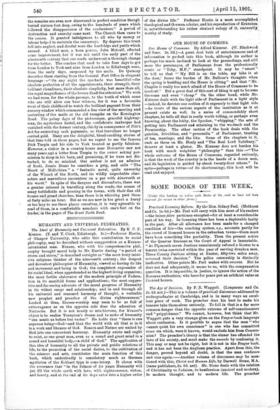HUMANITY AND UNIVERSAL FEDERATION.
The Ideal of Humanity and L'sri-:ersal Federation. By K C. F. Krause. (T. and T. Clark, Edinburgh. 5s.)—Professor Hastie, of Glasgow University, who edits this contribution to social philosophy, may be described without exaggeration as a Krause- intoxicated man. Krause, who with his comprehensive phil_ osopby brought moral help to Mr. Fiastie during "a period of storm and stress," is described outright as "the most truly intui- tive religious thinker of the nineteenth century ; the deepest and devoutest philosopher of Humanity, viewed as having its life and movement and being in God; the completest expounder of its social Ideal, when apprehended as the highest living organism; the most fertile elaborator of the modern principle of Federa. tion in its manifold forms and applications; the most sugges- tive and far-seeing advocate of the moral progress of Humanity in its widest range and relationship; and in and through all his universal and reasoned harmony of thought; a veritable new prophet and preacher of the divine righteousness." Looked at thus, Krause-worship may seem to be as full of extravagance as on the opposite side does the adoration of Nietzsche. But it is not nearly so mischievous, for Krause's object is to realise Tennyson's dream and to make of humanity "one music as before but vaster." He holds that "there is one supreme being—God—and that the world with all that is in it is a work and likeness of God. Reason and Nature are united by God into one concordant harmony. Humanity exists and ought to exist, as one great man, even as a sound and great mind in a sound and beautiful body,—a child of God." The application of this idea of humanity to all the private and public relations of life, to the promotioa of the social duties, to the cultivation of the sciences and arts, constitutes the main function of this book, which undoubtedly is consolatory much as German mysticism of the Eckhart type is consolatory. It closes with the assurance that "in the fulness of its years Humanity will yet fill the whole earth with love, with righteousness, virtue, and beauty, and at the end of its days enter into a higher order of the divine life." Professor Hastie is a most accomplished theological and German scholar, and his reproduction of Krausism is, notwithstanding his rather strained eulogy of it, eminently, worthy of study.






































 Previous page
Previous page